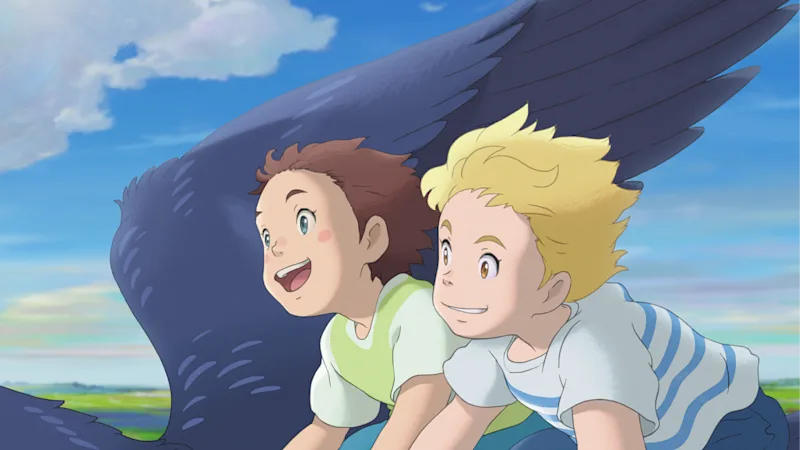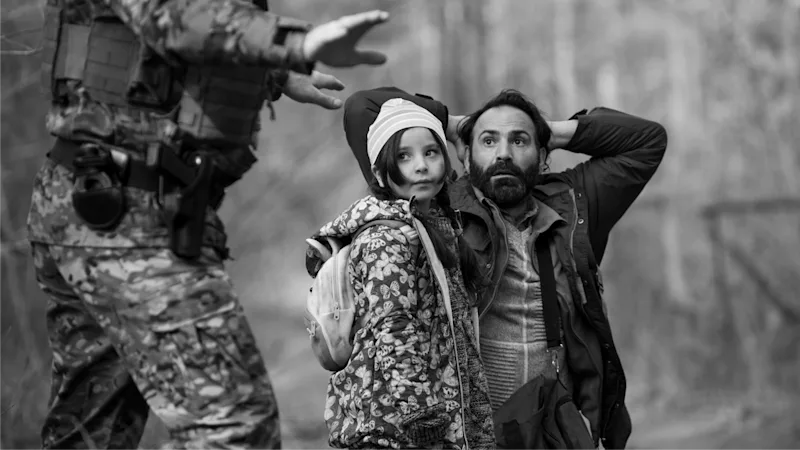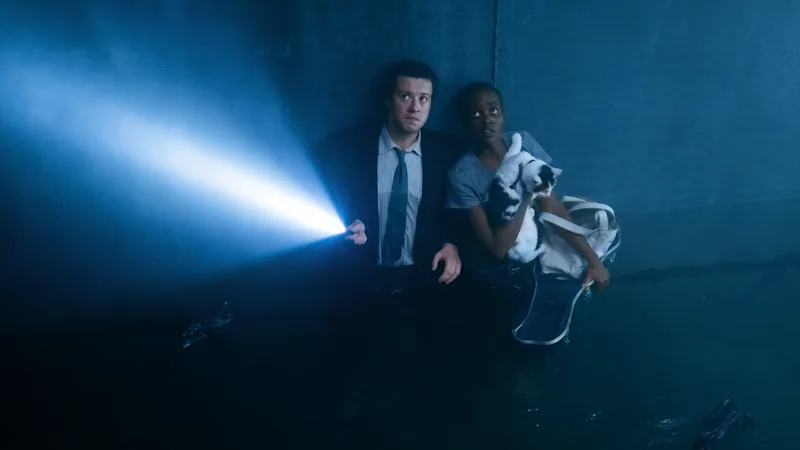In 2021, Ryûsuke Hamaguchi cemented his place on the world stage. That year, the Japanese filmmaker released the romantic triptych Wheel of Fortune and Fantasy, which won Berlinale's Silver Bear Grand Jury Prize, and then a few short months later, Drive My Car, a 3-hour Haruki Murakami adaptation that won Best International Feature Film at the 94th Oscars. Nonetheless, as 2021 was drawing to a close, Hamaguchi wasn't sure what the future held for him.
"When I finished working on Drive My Car, I thought I had put out everything that I could in that moment," he reflects. "I didn't really know what I wanted to do next." His answer came when Eiko Ishibashi, the Japanese singer-songwriter who'd composed the score for Drive My Car, made him an unexpected offer. "I approached Ryûsuke and asked him if he'd make visuals for me to accompany a live performance," Ishibashi says.
"In the beginning, I had no idea what I wanted or what the project was going to look like," the musician confesses. "Generally speaking, a lot of the images that are projected behind live performances tend to be abstract. But knowing what kind of work Ryûsuke does, I was interested in him making something that actually has a story."
For Hamaguchi's part, "I'd received a few offers from other people to work together after Drive My Car was released," explains the filmmaker, "but Eiko's seemed the most intriguing and compelling to me. So, I accepted."
Three years later, their collaboration has ultimately produced dual projects: Gift, the live performance by Ishibashi accompanied by the filmmaker's visuals, and Evil Does Not Exist, Hamaguchi's newest feature which incorporates the composer's transportive score. The latter is a parable about a rural Japanese hamlet that is threatened by a glamping initiative that would fundamentally change the local environment and, thus, the lives of the villagers. Evil Does Not Exist premiered at the 80th Venice International Film Festival, where it won the Silver Lion Grand Jury Prize and FIPRESCI Prize; Hamaguchi had not originally intended to release it at all.
"I had conceived of the movie as an original narrative work that would be adapted into the visual piece now known as Gift. I wasn't planning on theatrically releasing it as a standalone film," he tell A.frame. "Once we started shooting it and I heard the voices of the actors in it, though, I thought it would really be a shame if people didn't get to hear their voices too. So, after we were done shooting, I approached Eiko and asked for permission to complete the film as its own thing."
"Honestly, I was incredibly happy to hear that Ryûsuke wanted to turn what he'd shot into a full-fledged feature," Ishibashi says. "I didn't even realize that was on the table, so it almost felt miraculous when he asked me."

A.frame: Evil Does Not Exist is very different from Drive My Car, both tonally and thematically. What inspired the film's environmental themes?
Ryûsuke Hamaguchi: Eiko's music certainly had a big influence on the film. I think her music has elements that are quite unsettling; she doesn't allow you to feel safe while you're listening to her music. Her work also seems to continuously develop without ever becoming conclusive. With this film, I hadn't received a lot of music in advance, but I had worked with her on Drive My Car, so I had a fairly good idea of the kind of music she makes. I knew that I needed to make something that would harmonize with her music.
Eiko Ishibashi: One thing that influenced me was watching Ryûsuke's documentaries on the Tohoku region [of Japan] after it was struck by a big earthquake in 2011. Those films allowed me to visualize what the region looked like before that earthquake. I've always been interested in history and the memories associated with specific places and lands — I've made albums based on that theme — so seeing those documentaries made me feel a certain closeness between my own interests and Ryûsuke's work. Then, for about a year, he and I talked about a lot of different things, including the relationship between nature, cities, and trash. Through those conversations, we were able to really collaborate and share different ideas with each other.
Ryûsuke Hamaguchi: At first, I had no idea what that would look like.
When did you start to get a sense of what you wanted to do with the film?
Ryûsuke Hamaguchi: I eventually had the opportunity to go visit Eiko at the her studio and see where she creates her music. She lives in a house that's very close to nature, and she has her window wide open all the time and makes her music really loudly. I realized that she makes music by being one with the environment around her. I went out there to shoot her while she actually made some music, but that's also when I saw the nature that surrounds where she lives. Those places are in the film. It was during that trip that I realized that nature should be one of the focuses of Evil Does Not Exist, and that was when we decided to go in that direction.
How did that first inspiration evolve into what became Evil Does Not Exist?
Ryûsuke Hamaguchi: The time I spent researching was one of the biggest parts of my creative process for the film. I did a lot of what we in Japan call "scenario hunting," which is basically just researching and trying to find elements for a script. I really collected a lot of different ideas during that time. Throughout that period, I was introduced to a lot of Eiko's local friends, and many of the people I met became models for the characters in the film. I was introduced to a nature expert who knew the names of all the trees in the area, where the water in the local springs comes from, and even where the local wasabi grows. That person really helped me discover some of the film's nature motifs, but I also realized that just capturing nature in all of its beauty wouldn't necessarily result in a film that would be interesting, at least to me. I realized that I still needed to find something dramatic that could be at the core of the film.
What I was looking for was a way to spotlight the connection between humanity and nature. It was around that time that Eiko introduced me to another friend of hers who told me about a glamping incident that's very similar to the one in the film. I thought it could be a very interesting way to both express something about the contemporary times we live in and connect human activity and nature together. In that sense, the film's story is rooted in reality. At the same time, its second half is very fictitious.

The film clearly came about in a rather unorthodox fashion. How long did it actually take to make the movie once you knew what you wanted it to be?
Eiko Ishibashi: While exchanging our ideas about everything from trash and nature to dust, I sent Ryûsuke some demo music. With the footage he shot of myself and Jim O'Rourke performing together during his visit, he began to experiment and test how certain images would play against the music he had. When I saw what he'd made, though, I felt like he was creating something that was purposefully close to my music. I told him that what I actually wanted him to do was create as he usually does. Once he heard that, he started writing his script, and it was when the screenplay was finished that I began thinking about the string music you hear in the film.
Ryûsuke Hamaguchi: I got the original offer [to do Gift] from Eiko around the end of 2021, but I didn't go film her at her studio until September 2022. In between, there was a period where we were exchanging a lot of emails and sharing with each other the themes that we were interested in. Eventually, that all resulted in the creation of a film with a plot and story, and the movie itself was completed around the start of 2023. We went into production in November 2022, but I spent a long time researching before then, so the actual writing of the film's script was done quite quickly. It only took about a week to write.
Eiko Ishibashi: Our process really was like exchanging letters. Nothing came out of absolutely nothing. It was all created out of a process of detailed exchanges, so it was actually quite easy for me to make the music for the film when the time came to do so.
Ryûsuke, you use Eiko's music in a really interesting way in the film. It's very prominent, but there are moments when it just cuts off. What inspired that decision?
Ryûsuke Hamaguchi: When Eiko first started sending me the music she'd created, each piece was really wonderful. I thought the same thing when we worked on Drive My Car together, but there was a different kind of appeal to what she'd made for Gift and Evil Does Not Exist. The music that she specifically created after she'd seen an edit of the feature film was, I thought, really wonderful and beautiful in and of itself. I knew that it would help the audience experience the film correctly. However, the music was also so beautiful and pleasant to listen to that I thought it would limit or distract from the richness of the viewing experience. I needed both the music and images to work well together. As a result, I chose to sometimes abruptly or violently cut the music when I was editing the film.
Her music is so beautiful that I think listening to it opens the audience up more, because they just want to keep listening to it. It makes them more sensitive to the film as a whole and more likely to notice certain things about the environments and images they're seeing. Things that might seem abstract become much more alive and tangible. I realized that, by carefully using Eiko's music, I could actually highlight both the power of the film's images and give those same images a sense of life. I really wanted to just make sure that both the music and the visuals could stand firmly together.
Eiko Ishibashi: I had assumed that he wasn't going to use too much of my music in the final cut of the movie. When I watched it, I was shocked to discover that he'd used way more of it than I expected, and I found the way he uses it in the film surprising. It feels really dynamic in a way that I didn't see coming.
Eiko, what was your reaction to seeing how Ryûsuke ultimately uses the music you composed for the film?
Eiko Ishibashi: When we started talking about Gift as a project, I didn't tell Ryûsuke what kind of music I was going to make. But I realized when I watched what he had created that he had formed his own feelings, interpretations, and thoughts about my music. Personally, I don't really know what kind of music I make. When I make music, I'm often struggling to do it. I'm always questioning myself and asking, "Is this the right kind of music to be making? Why make music at all when there's already so much out there?" When I saw what Ryûsuke created, I was able to see how he views my music, and I think, in that way, watching the film was a very unique experience for me. Ultimately, I was really happy with how he chose to use my music.

The movie is, at times, surprisingly ambiguous. It doesn't feel the need to explain itself. As a musician, is that a kind of creative storytelling that you're drawn to, Eiko?
Eiko Ishibashi: When I'm making music, I'm trying to pack it with a lot of things, including what I think it means to be a human being and what's going on in the world. I don't like to be super clear about how any of those thoughts or emotions are presented, though, so that often leads to the music taking on a more abstract or experimental form. With Evil Does Not Exist, there's certainly an impression of abstractness and ambiguity throughout the film. However, what happens in it is, to me, very concrete. I think the balance it achieves between ambiguity and clarity is really wonderful. It's something that I hope to learn from and achieve in my own work.
It sounds like you both genuinely enjoyed making these two projects together. What was it about your creative collaboration this time that you found so rewarding?
Eiko Ishibashi: I think my work and exchanges with Ryûsuke have made me understand just how important process is. It's not just the attention that he pays to his work and his own creative process, either, but also to his crew and actors. He deliberately engages in thoughtful exchanges with everyone he works with, and he strives to collaborate with them in that way. As a composer, to see and feel that level of collaboration is something that I'm very grateful to have experienced two times now.
Ryûsuke Hamaguchi: Doing interviews for the film now has given me the chance to go back to our original emails and reflect on the conversations we had. In doing so, I've realized again just how much of an effect our exchanges ultimately had on the film. Specifically, there was a conversation we had where we talked about dust as a theme. I shared with her a film called Dust by Hartmut Bitomsky, and the sharing of that allowed us to talk about the movements of non-human elements and how I felt that idea might fit well with her music. In her responses, Eiko told me that she had actually already made music about dust in the past. [Laughs] So, even though it wasn't a super conscious decision on our parts, I think that the conversations we had led to what we ended up making. It's all a result of the process we engaged in and the time we took together.
Eiko, it was you who approached Ryûsuke about working together again after Drive My Car, so it seems only right to ask: Do you have any plans to work with him again?
Eiko Ishibashi: I'm very busy right now with Gift, and I'm sure that Ryûsuke would like a break from me for a bit. [Laughs] But I would love to have the opportunity to collaborate with him again in the future.
By Alex Welch
RELATED CONTENT:
Ryusuke Hamaguchi: 5 Films That Inspired 'Evil Does Not Exist'
Asian American and Pacific Islander Heritage Month 2024: Films to Watch in Celebration







